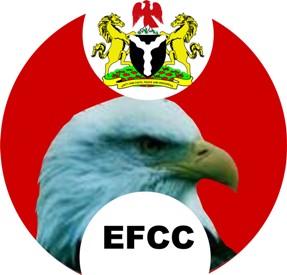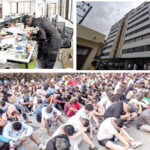September 30 is a significant day for the cause of justice in Nigeria. It is the appointed final day of the year in which Nigeria’s Economic and Financial Crimes Commission (EFCC) must report to the National Assembly according to the EFCC law.
In principle, every public official, including former office-holders, fears the EFCC because it wields authority over illegitimate wealth in the country. On September 30, its annual report is the barometer of the state of our soul.
- PODCAST: Female genital mutilation: the survivors’ story
- Masari to Nigerians: Stand for a united Nigeria
Last Thursday, I waited to see whether Abdulrasheed Bawa, the youthful head of the agency who was appointed in February, would appear at the National Assembly in hour of the reporting obligation that all his predecessors except Nuhu Ribadu, the pioneer chairman who recruited Bawa in 2004, have resented and betrayed.
I label the reporting requirement “fear of the truth”.
This fear is everywhere in our political, legal and cultural system. The one man who understood it was Olusegun Obasanjo, who governed between 1999 and 2007. He hoped never to have to confront it himself, but he realized that this weapon was the difference between democratic maturity and pretension.
To his credit therefore, Obasanjo made sure that this reporting requirement was carved into Section 37 of the EFCC Establishment Act 2004 in the following words: “The Commission shall, not later than 30th September in each year, submit to the National Assembly, a report of its activities during the immediately preceding year and shall include in such report the audited accounts of the Commission.”
This non-negotiable report is an accounting debt the agency owes in perpetuity. One would therefore expect copies of it to be prominently listed in its archives, such as its website, but there is no such thing. It also makes sense to expect legislature, having received and debated the report, to list it in its archives, including its website. That is not the case, either.
The EFCC submitted its first report—and its last—in 2006. This means that by last week, the commission has flouted this reporting requirement several times, aided and abetted by a complicit National Assembly.
It is ironic that the EFCC preaches accountability daily, including that one day in which it can demonstrate what it means by reporting to the people, but hypocritically fails the test.
The truth is that by breaching its own law, the EFCC compromises the authority on which its work rests. It confirms to the public that it is itself an outlaw: that might is right, and justice negotiable. The EFCC may be all-powerful, but it is scared to look in the mirror. The point about being an outlaw is not having to be accountable.
This fear of the truth haunts Nigeria. If a powerful member of the society destroys your business or your reputation, he has no fear of being held accountable. If someone is dragged out of his car in traffic and killed by “unknown” persons, the bereaved family has no recourse because the police, like the EFCC, cannot be held accountable.
Around the world, the police are often the first clear measure of how civilized a society is, in the execution of its responsibility for maintaining law and order. When someone is killed for instance, the police want to know who is responsible, irrespective of whether that person is a prince or a pauper.
The extent to which the resources of the state are deployed to ensure a full and complete investigation, and to bring the perpetrator to justice—whether he is a prince or a pauper—is the clearest measure of the quality of that culture. At the end, charges may not be filed, depending on how the investigation unfolds, but a report will be filed.
Not in Nigeria, where the police lack this obligation in character, practice, and the law. The closest thing to it in the Nigeria Police Act 2020 is in Section 69(1): “On the last working day of every month, an officer in charge of a police station must report to the nearest magistrates the cases of all arrests made without warrant in his jurisdiction, whether the suspect have been admitted to bail or not.”
But even if every such officer complied (the Act does not say the report must in writing or certified or over whiskey), the provision does not cover all crimes or investigations, and provides no commitment to such reports being moved upstairs to the commissioner, let alone the Inspector-General of Police.
As a result, the Force never reports crime statistics, such as how many murders are in its records periodically, let alone how many are investigated and prosecuted. If a reporter interviews a police commissioner about homicides in his state, he laughs off the question. The IGP can wax lyrical about how much more funding he would like, but he never discloses how many homicides he did not solve last year let alone how many people died in police custody.
This fear of the truth is pervasive and extensive. For instance, if at the beginning of this essay you hurried to the website of the EFCC, you would not find the EFCC Act, the commission having clearly decided that the fewer Nigerians who know about its reporting obligation, the better. I provided a link to the Act for this reason.
The website of the police does not contain the Police Act 2020 either. Nigeria’s principal legal officer, Attorney General Abubakar Malami has no hesitation traveling to New York to pronounce on issues of no interest to Americans, but the website of his Ministry of Justice does not have the Constitution of the Federal Republic. The Supreme Court does not and the presidency does not. This widepread dereliction leaves you to wonder where these officials expect students and citizens and journalists and foreigners to find this pre-eminent document. We hate to empower the citizen.
On Friday, however, as Nigeria celebrated its 61st year, General Muhammadu Buhari was lashing out on fronts, claiming to have outperformed his predecessors. But everyone knows that when a government feels the need to praise itself—or to rent praise singers, at home or abroad—that government is a failure. No government in Nigeria in the last 61 years has driven the country not simply to poverty and shame the way Buhari’s has done in the past six years but towards doubt, dissension, and dissolution.
“We remain confident that our goal of lifting 100 million Nigerians out of poverty in 10 years is achievable,” Buhari said. This is a baseless claim; indeed, the statistics of the World Poverty Clock and the World Bank demonstrate that Buhari’s government plunges Nigeria deeper into poverty every day. There are now nearly 90 million Nigerians in extreme poverty, compared with 70 million in 2016.
But Buhari would rather pick up his whip. “Our media houses and commentators must move away from just reporting irresponsible remarks to investigating the truth behind all statements and presenting the facts to readers.”
It would seem that “irresponsible remarks,” has become a new category of crime, one I hope this comment is not guilty of as this bus heads into the night.
This column welcomes rebuttals from interested government officials.
• @Sonala.Olumhense

 Join Daily Trust WhatsApp Community For Quick Access To News and Happenings Around You.
Join Daily Trust WhatsApp Community For Quick Access To News and Happenings Around You.

